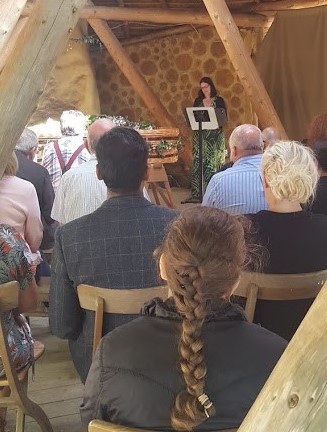What is a funeral?
A funeral is a service or ceremony to remember, honour, pay tribute to or celebrate the life of someone who has died. It is a time to remember, to say goodbye and to show support for those who loved and will miss that person. A funeral is a ritual, or rite of passage, marking transitions both for the person who has died and their family and friends. A funeral is also a very important milestone; saying goodbye in a meaningful and appropriate way is a key part of the grief journey. Traditional or ‘normal’ funerals also usually include the burial or cremation – but as we’ll see, that doesn’t necessarily have to be the case.
Why do we have funerals?
A funeral is much more than simply the burial or cremation. Funerals are an opportunity for those close to the person who has died to remember, and to share their memories. Funerals confirm the reality of the death, which is particularly important where the death is sudden or unexpected. Funerals bring together the community of those who knew and loved someone to support and comfort each other. The process of arranging the cremation or burial and putting together a funeral ceremony is an important time; a chance to review and remember, to talk to others about their memories and thoughts, an opportunity to say anything that has been left unsaid. We have funerals not so that the burial or cremation can take place but for the benefit of the mourners. A fitting funeral service plays a significant part in mourning and anecdotal evidence from bereavement counsellors indicates that grief can be complicated if there has not been a chance to say goodbye in a meaningful way.
What happens if we can’t have a traditional funeral?
Sometimes the circumstances in which a person died, or their geographical location means that mourners cannot attend a traditional funeral. At the present time in the UK the social distancing measures introduced in response to the coronavirus pandemic means that churches are closed and many crematoriums are either closing their doors or severely limiting the number of mourners who can attend. The burial or cremation can go ahead with no mourners in attendance (usually called a Direct Cremation or Direct Burial), but this doesn’t allow for a funeral service at the same time. However, the funeral service is so much more than just the burial or cremation: the service for the mourners can most definitely still go ahead as it’s not necessary for them to all be in the same place at the same time.
Remote Funerals
If it’s not possible to have a funeral which brings everyone physically together, mourners can still be connected through technology. Remote funerals are possible, with everyone sitting in their own home joining a service led by a celebrant sitting in theirs. Mourners can share rituals such as lighting candles, sharing memories or giving tributes, reading poems or prayers, listening to music, raising a toast, wearing a favourite colour or making and eating someone’s favourite food. Words of farewell can be spoken to say goodbye to the person who has died, without the coffin having to be in the same room. And, most importantly, these rituals can still provide what we need from funerals, answer the reasons why we have funerals – they bring everyone together albeit virtually rather than physically, they provide comfort and show support, they allow everyone to remember and they give everyone the chance to say goodbye.

Should I delay the service until we can have a more normal gathering?
If you think about the reasons why we have funerals, you’ll see that it’s necessary to have some sort of service around the time of the death. The process of ‘sorting through’ memories, thoughts and feelings about the person who has died is extremely helpful to someone who is grieving. Putting together a funeral service, talking about the person who has died, telling their story, is a helpful way to start along the path of living without a loved one. Even if you can’t attend a church or crematorium for a service, you can still plan a meaningful funeral to have in the here and now.
Memorial or Celebration of Life Services
There is, of course, also the option to have a Memorial or Celebration of Life service at a later date, when everyone can gather together to remember a life but it’s important that that doesn’t replace the funeral. The immediate need to confirm the reality that the death has happened, to say goodbye and to show support and comfort for those close to the person who has died doesn’t go away. Funerals very much do still need to be held, we just need to think more creatively and originally about what a funeral is and why we do have funerals, and find ways of meeting those needs without being physically present at the burial or cremation.
Further Information
If you’d like me to help with a distance funeral, or some advice on how to bring everyone together in remembering even when you can’t be physically together, see Remote Funerals.
For a more academic look at funeral rituals and their impact on grieving, see this article from the Funeral Guide website.




 For those who have been bereaved, no matter whether recently or many years ago, Christmas will never be the same again. Whether you yourself are grieving at Christmas, or whether you’re supporting someone who is grieving this Christmas, this article may help you to cope with the festive season.
For those who have been bereaved, no matter whether recently or many years ago, Christmas will never be the same again. Whether you yourself are grieving at Christmas, or whether you’re supporting someone who is grieving this Christmas, this article may help you to cope with the festive season.

